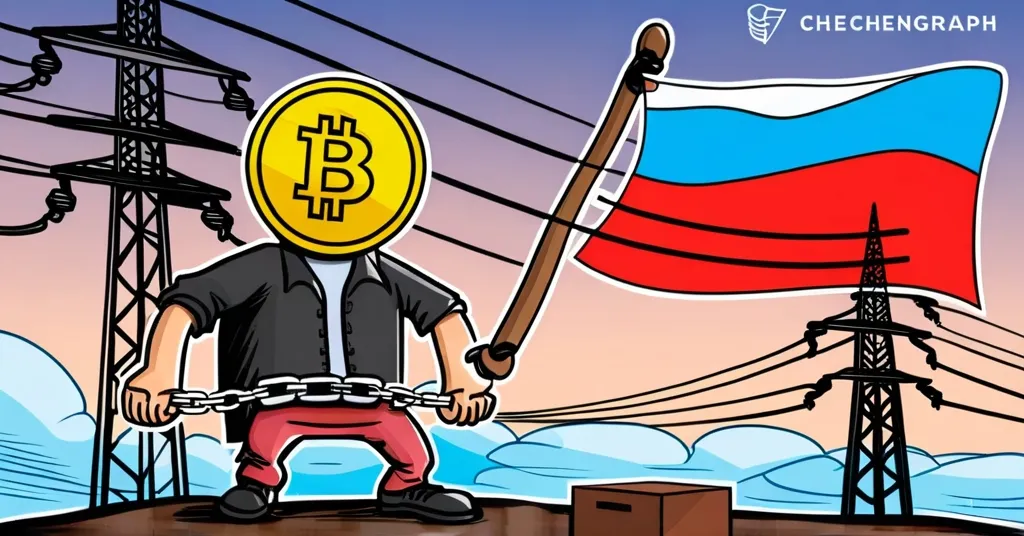Chechnya to Treat Crypto Miners as Terrorists Starting 2025 Amid Energy Crisis

Lawmaker Warns Crypto Miners in Chechnya Will Be Treated Like Terrorists in 2025
Starting January 1, 2025, crypto miners in Chechnya will face a harsh reality: they will be treated as terrorists under new legislation due to significant electricity shortages. This severe measure reflects Russia’s broader effort to control the impact of crypto mining on its national power grid.
- Crypto miners in Chechnya to be treated as terrorists from January 1, 2025.
- Ban extends to other Russian regions due to energy shortages.
- Legislation backed by President Putin’s crypto circulation bill.
Crypto mining, the process of using computers to validate transactions and add them to the blockchain, consumes vast amounts of electricity. This has led to severe strain on the power grid in regions like Chechnya, prompting Russian State Duma lawmaker Adam Delimkhanov to declare on Tsargrad TV, “We will equate them with terrorists, since their actions harm the whole society.” This isn’t just a Chechen issue; several other Russian regions, including Dagestan, Donetsk, Lugansk, Irkutsk, Buryatia, and Zabaikalsky, are imposing similar bans due to the same reason: electricity shortages.
The ban, set to last until March 15, 2031, is backed by a bill signed by President Vladimir Putin. This legislation allows regional bans on mining and imposes other crypto-related restrictions, reflecting a broader crackdown on the crypto mining industry in Russia. While some regions like Ingushetia, Kabardino-Balkaria, Karachay-Cherkessia, North Ossetia, Zaporozhye, and Kherson are also affected, the focus on Chechnya underscores the severity of the situation.
The crypto mining industry has been a mixed impact for Russia. On one hand, it has provided a lucrative revenue stream for energy companies like Gazprom Neft, Sberbank, and Rusal. On the other hand, the high energy consumption has led to significant power shortages, causing disruptions across several regions. This has forced the government to take drastic measures, equating miners with terrorists in Chechnya, a move that’s been criticized as overly harsh but highlights the urgency of the energy crisis.
Instead of equating miners with terrorists, some argue for technological solutions to manage the energy crisis more effectively. Dmitry Poltorak, CEO of Lartech, has highlighted the potential of AI-powered smart meters, which are devices that can monitor and manage electricity usage in real-time. These could enhance transparency and security in the energy sector, potentially offering a solution to the energy crisis caused by crypto mining. Critics point out that such technology could help detect illegal mining operations, which have been a problem in regions like Irkutsk. For more on technological solutions, see discussions on Quora.
Internationally, Russia’s use of cryptocurrencies to navigate trade challenges under Western sanctions adds another layer of complexity. The U.S. Treasury Department has increased scrutiny of Russian crypto activities, including sanctioning companies like BitRiver. This indicates heightened geopolitical tensions surrounding the sector, especially as Russia seeks to leverage cryptocurrencies to bypass traditional financial systems. For more on Russia’s cryptocurrency regulations and sanctions, see Chainalysis.
While the ban in Chechnya and other regions aims to address immediate energy concerns, it raises questions about the future of crypto mining in Russia. Will the country find a balance between harnessing the economic potential of cryptocurrencies and ensuring energy sustainability? The introduction of a regulatory framework in November, requiring industrial miners to register with the tax authority, suggests a move towards more controlled growth of the sector.
Looking globally, other countries like Kazakhstan have faced similar challenges with crypto mining’s energy consumption, leading to restrictions. This global context highlights the need for a nuanced approach to managing the impact of crypto mining on energy resources. For more on the global perspective, see the Wikipedia page on the legality of cryptocurrency by country.
The economic implications of the crypto mining ban are significant, particularly for the energy sector. While the industry has generated revenue for companies, the ban could affect the broader economy, especially under the current sanctions regime. As Russia navigates these challenges, the future of crypto mining remains uncertain, with ongoing debates about balancing economic benefits with energy sustainability. For more on the impact of crypto mining on Russia’s energy sector, see GIS Reports Online.
Equating miners with terrorists in Chechnya is a drastic move, but it underscores the severity of the energy crisis. Crypto miners might soon find themselves trading GPUs for handcuffs in Chechnya, but technological solutions like AI-powered smart meters could offer a more balanced approach to managing the impact of crypto mining on the power grid.
Key Questions and Takeaways
- Why are crypto miners being equated with terrorists in Chechnya?
Crypto miners are being treated as terrorists due to the severe strain their activities place on the region’s electricity supply, which is seen as harmful to society.
- When will the crypto mining ban in Chechnya take effect?
The ban will take effect on January 1, 2025.
- How long will the crypto mining ban last?
The ban is set to last until March 15, 2031.
- Which other regions in Russia are affected by the crypto mining ban?
Other affected regions include Dagestan, Donetsk, Lugansk, Irkutsk, Buryatia, and Zabaikalsky, as well as Ingushetia, Kabardino-Balkaria, Karachay-Cherkessia, North Ossetia, Zaporozhye, and Kherson.
- What legislative action enabled the regional bans on crypto mining in Russia?
The bans were enabled by a bill signed by President Vladimir Putin, giving lawmakers the power to control crypto mining and impose restrictions on crypto-related services.
- What are the potential technological solutions to the energy crisis caused by crypto mining?
Technological solutions like AI-powered smart meters could help manage and monitor energy consumption more effectively, potentially mitigating the impact of crypto mining on the power grid.
- How does the international community view Russia’s use of cryptocurrencies under Western sanctions?
The U.S. Treasury Department has increased scrutiny of Russian crypto activities, including sanctioning companies like BitRiver, indicating heightened geopolitical tensions surrounding the sector.
- What are the economic benefits of crypto mining in Russia?
Crypto mining has provided a lucrative revenue stream for energy companies like Gazprom Neft, Sberbank, and Rusal, despite the strain on the national power grid.
- What are the future prospects for crypto mining in Russia?
The future of crypto mining in Russia remains uncertain, with ongoing debates about balancing economic benefits with energy sustainability.
“We will equate them with terrorists, since their actions harm the whole society.” – Adam Delimkhanov



